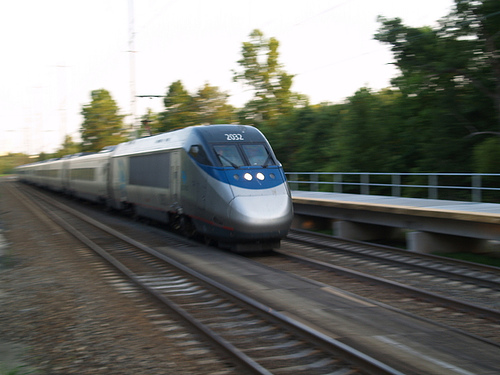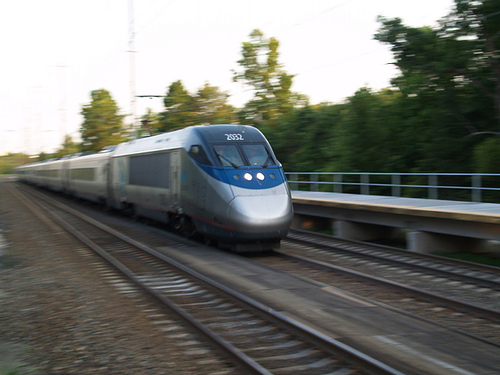 Photo: Tim GilliamTurning down federal money for rail projects looks like it’s turning into a badge of honor for Republican governors. Chris Christie has done it in New Jersey. Scott Walker has done it in Wisconsin. John Kasich has done it in Ohio.
Photo: Tim GilliamTurning down federal money for rail projects looks like it’s turning into a badge of honor for Republican governors. Chris Christie has done it in New Jersey. Scott Walker has done it in Wisconsin. John Kasich has done it in Ohio.
Now Florida’s Rick Scott, a Tea Party favorite, has jumped on the bandwagon (that would be a bandwagon traveling down the interstate highway system, thank you very much). Some are seeing his high-profile resistance to high speed rail, and his rejection of $2.4 billion to fund a connection between Tampa and Orlando, as precursor to a possible presidential bid.
The Obama administration has affirmed and reaffirmed its commitment to the vision of a nation in which 80 percent of Americans would have access to high-speed rail connections — and to spending $53 billion over the next six years to get that network going. And it seems like Republican gubernatorial resistance to rail projects is growing in direct proportion to the Obama administration’s promotion of the same.
Not all Republican legislators are on board with the idea of turning down federal infrastructure investments in their home states (and letting the cash flow to more receptive places, like California). Rep. John Mica (R-Fla.), chair of the House transportation committee, was not happy with Scott’s blocking of the rail funds, and he has been part of negotiations to find a creative financial solution that will let the project go forward. Members of Florida’s Republican-controlled state senate issued a letter rebuking Scott for his action, writing that “Politics should have no place in the future of Florida’s transportation.”
Scott’s objections to the project? He’s concerned that the state will be on the hook for cost overruns, that ridership won’t meet projections, and that the system won’t be able to pay for itself.
Which raises an interesting comparison with the interstate highway system.
“Can you imagine if the governor had tried to kill Eisenhower’s interstate highway system? That’s what we are facing today,” Sen. Bill Ben Nelson (D-Fla.) was quoted as saying in The Florida Times-Union.
It’s an apt comparison, because roads don’t pay for themselves, either. Any attempt to help them do so — by raising the gas tax, for instance, or implementing a tax based on how far you drive — is met with howls of resistance, especially from Republicans. New Jersey Gov. Christie, whose tough talk on spending cuts has made him a darling in certain GOP circles, would no sooner ask the state’s residents to pony up more to drive its roads than he would admit to harboring any presidential aspirations himself.
A recent poll showed that even though Americans see transportation as vitally important, they don’t want to have to pay for it. Of course, reality doesn’t work like that.
For rail advocates, the kneejerk resistance to expanding the nation’s train system is baffling and misguided. I had the chance to talk earlier this week with John Robert Smith, the CEO of transportation advocacy organization Reconnecting America. Smith is a former mayor of the small city of Meridian, Miss. — and a Republican.
Smith is also a former chairman of the board of Amtrak, and he has seen a bipartisan coalition of legislators fight to save the system. That experience makes him think that it will be possible for the president’s rail initiative to go forward, despite the current pushback.
“It’s unrealistic for this country not to be investing in transportation infrastructure, especially in this challenging financial time,” said Smith, who emphasized that high-speed rail would be part of an integrated system that includes highways, airports, transit, and conventional rail.
Smith acknowledged that getting people to think in terms of long-range benefits can be difficult, but he insisted it is possible: “That’s where vision and leadership come in,” he said. “When you are able to lift your eyes beyond the horizon line of today’s problems and challenges and set a course for a future that is beyond your term in office. Lincoln built a transcontinental railroad during the most turbulent, depressing time this country has ever known.”
He went on to explain how the conversation about transportation infrastructure should be framed: “We have to say, Ladies and gentlemen, we are dealing with the future of this country. It is a national security issue, it is an environmental issue, it is above all a jobs creation issue. I think there are men and women capable of leading that discussion and crafting that vision together.”
We’ll see.



